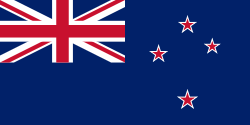| New Zealand at the 1990 Commonwealth Games | |
|---|---|
 | |
| CGF code | NZL |
| CGA | New Zealand Olympic and Commonwealth Games Association |
| Website | www |
| in Auckland, New Zealand | |
| Competitors | 224 in 12 sports |
| Flag bearer (opening) | Anthony Mosse |
| Flag bearer (closing) | Gary Anderson |
| Officials | 61 |
| Medals Ranked 4th |
|
| Commonwealth Games appearances (overview) | |
New Zealand at the 1990 Commonwealth Games was represented by a team of 224 competitors and 61 officials. Selection of the team for the Games in Auckland, New Zealand, was the responsibility of the New Zealand Olympic and Commonwealth Games Association. New Zealand's flagbearer at the opening ceremony was swimmer Anthony Mosse, and at the closing ceremony was cyclist Gary Anderson. The New Zealand team finished fourth on the medal table, winning a total of 58 medals, 17 of which were gold.
Contents
- Medal tables
- Competitors
- Athletics
- Track and road
- Field
- Combined
- Badminton
- Boxing
- Cycling
- Road
- Track
- Diving
- Gymnastics
- Judo
- Lawn bowls
- Shooting
- Swimming
- Synchronised swimming
- Weightlifting
- Officials
- See also
- References
- External links
New Zealand has competed in every games, starting with the British Empire Games in 1930 at Hamilton, Ontario.